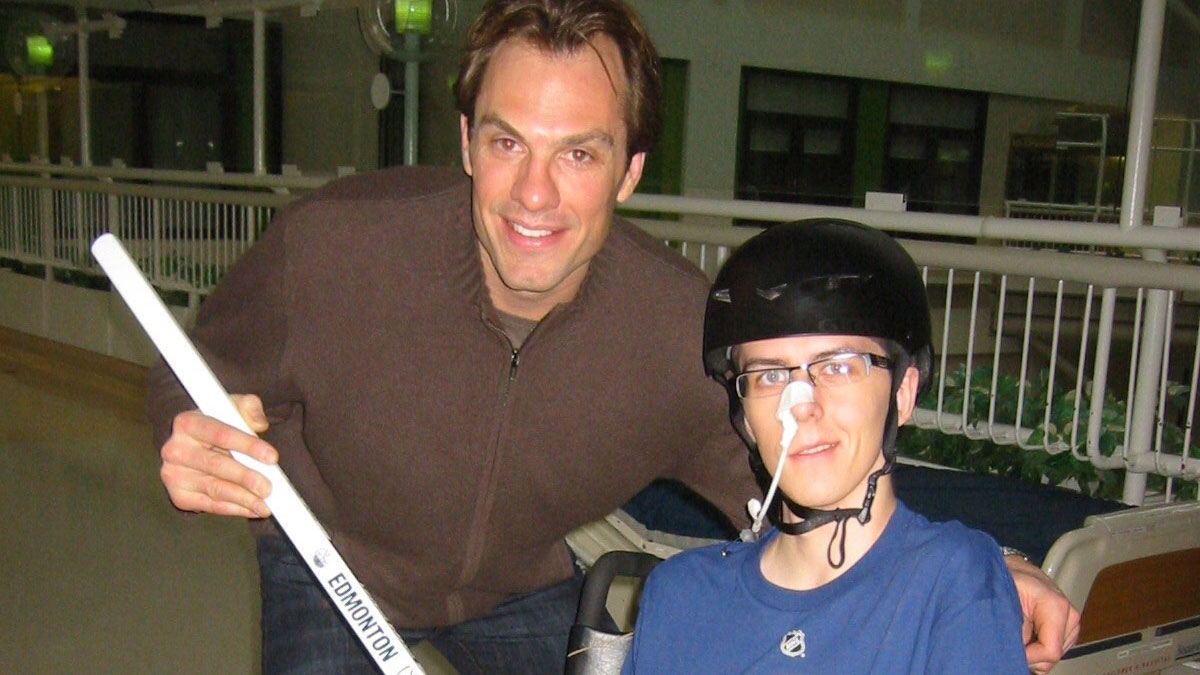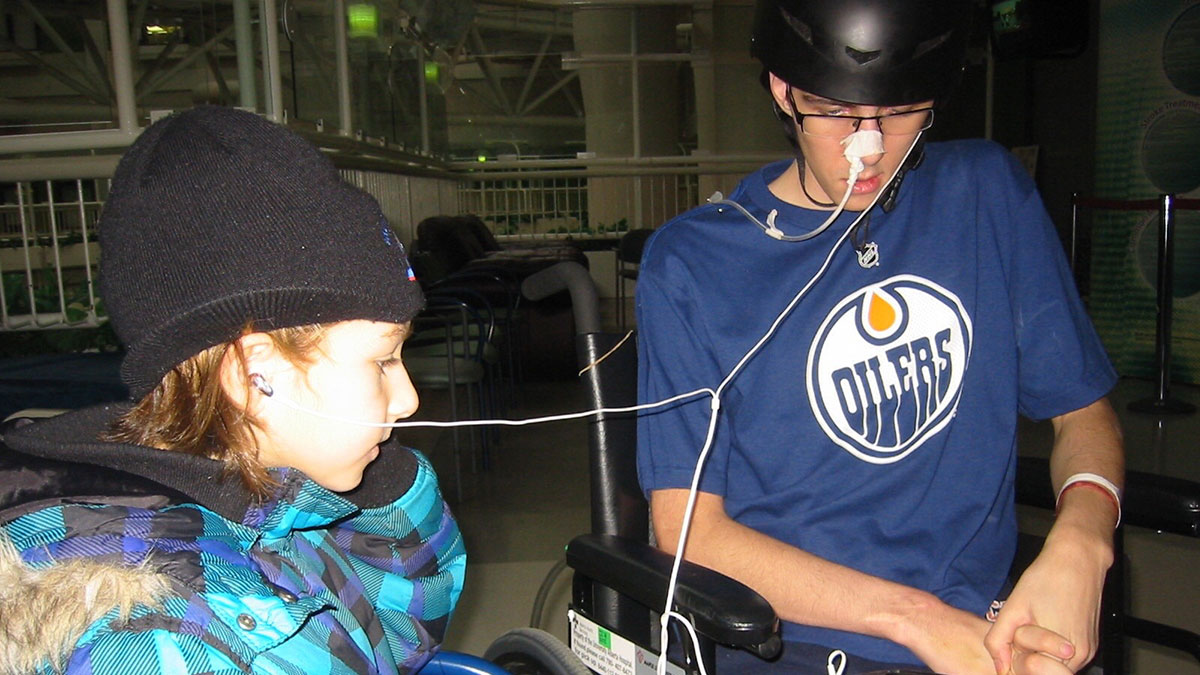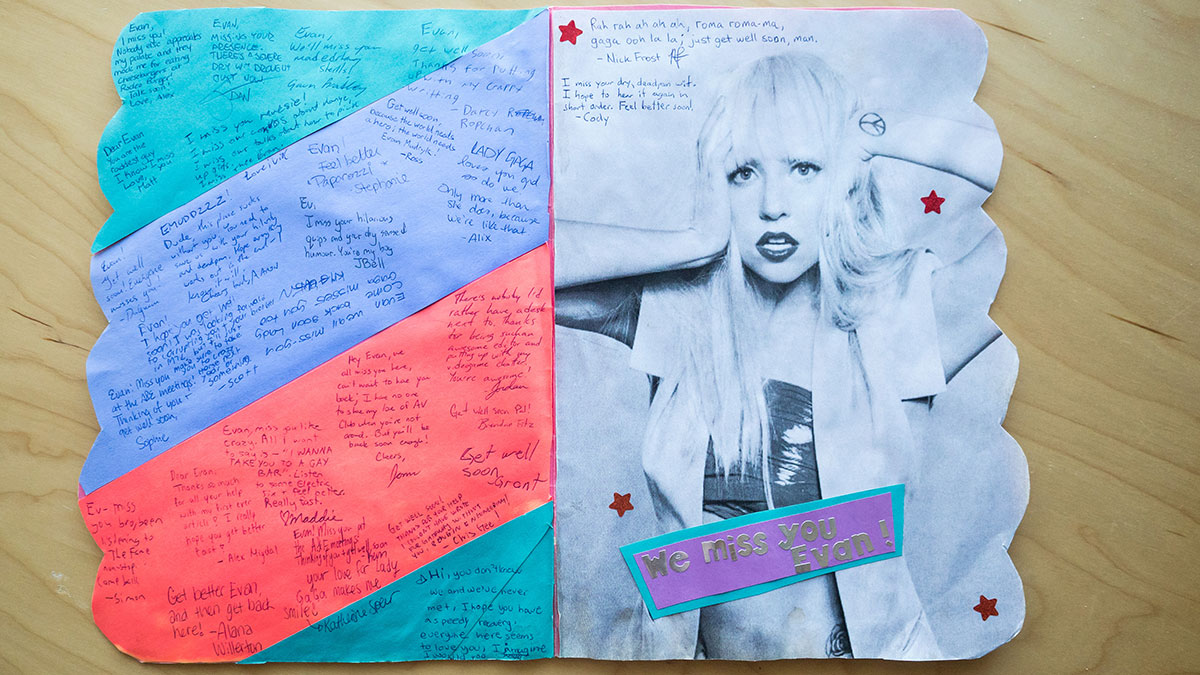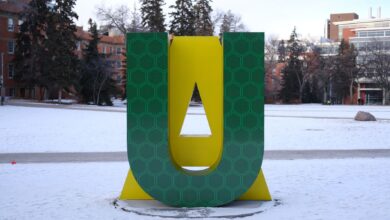Feature: My Beautiful Dark Twisted Road to Recovery
 Ab Sch
Ab Sch2010 was an important year in my life. I was working as the Arts & Entertainment editor at The Gateway, which was to turn 100 that year. Kanye West released My Beautiful Dark Twisted Fantasy, which would become one of my all-time favourite albums. I was in my second year of a Bachelor of Arts degree at the University of Alberta. And on Nov. 21, at the age of 20, I had a stroke.
I have a vivid recollection of the night I had the stroke. The Gateway hosted a party to celebrate its centennial, and afterwards we ended up at the Sherlock Holmes pub. We were sitting on the second floor and having a few drinks. A picture was posted of me and a friend and I gave a thumbs up with my right hand, which would end up being my bad side after the stroke happened later that night.
I watched the hockey game highlights from the Chicago Blackhawks vs. Vancouver Canucks game and drank half my beer. I was talking with my friends, usual bar chat. At this point, is when I think my stroke began.
After using the washroom, I went to get more beer. After politely asking for a beer, the bartender laughed at me saying, “You have had quite enough!” and walked away. I was disjunctive and confused, there was no way I’d had that much to drink, but the bartender thought differently. I felt myself start to drool and my speech was almost gone. I ran upstairs and my face didn’t feel right. Instead I ran downstairs to get fresh air, to cool off. It was wintertime but I persisted and I tripped with my whole body hitting the floor. I was paralyzed and couldn’t move. Then my colleagues, two or three other people carried me into the freezing cold outside of Sherlock Holmes. They kept asking, “You okay?” and “what’s wrong?” and I said to myself, “Something is quite wrong here. Call the ambulance right away!” But that probably came out as gibberish. Everyone there from my brother Lance to the bartender brushed me off, thinking I was just too drunk to function. If it weren’t for then Editor-in-Chief Jonn Kmech, who decided that someone should call an ambulance, I would probably be dead. At 1:50 a.m. on Nov. 21, 2010, I faded out of consciousness in an ambulance heading straight for the hospital.
My stroke wasn’t caused by a preventable illness. I have an existing condition called Arterial Venous Malformation (AVM), which in the simplest term, is a blood vessel abnormality in the brain. The tangle of abnormal arteries and veins can bleed often without any symptom. In my case, it happened until it became a bigger problem.
AVM affects probably less than 1 per cent of the population. In some families there is a genetic susceptibility, but in others it’s a random occurrence. The causes of AVM are at this point, unknown.
After the ambulance picked me up and realized that I was having a stroke, I went into emergency surgery to stop the hemorrhage and save my life. The surgery was performed by Dr. Cian O’Kelly, a neurosurgeon.
A piece of my skull was removed to take pressure off my brain, but it was not reattached immediately so my brain could sufficiently heal. So for the five months following the surgery I wore a helmet while a piece of my skull was kept on ice, waiting to be reunited with my head.

10 days after the stroke, on Dec. 1, I woke up in the U of A hospital from a coma, unable to speak or walk. Unable to comprehend what had happened to me, I immediately tried to rip the feeding tube out of my throat (this happened two more times while I was in the hospital). I can’t explain why, maybe I didn’t believe anything was wrong. I was in the coma for several days after surgery. But, surprisingly, I was awake for a while, looking around but not speaking. My mother says I played with her ring turning it round and round and pulling it up and down on her finger. I have no recollection of this.

When I started recovery, I didn’t know what I would be able to accomplish again. I’m now paralyzed on my right side, so I struggle with moving my right arm, leg and facial muscles. It’s hard work, I’m still trying to get mobility back. I focus on how good it is to be alive and well. I look at what’s ahead and embrace the challenge. The uncertainty pushed me. I’m here, but not where I want to be yet. The uncertainty of where I will end up is exciting. It’s a funny thing to be uncertain.
Soon after I began the recovery process, I was out of the wheelchair. I was lucky to regain mobility quickly. I now have a WalkAide, which helps my paralyzed right leg to walk. I can almost walk perfectly again, and I’ve begun incorporating slow jogging and semi-daily swimming into my routine.
When I came out of the coma, I only spoke in gibberish. I could only say “yes,” “no,” and “good times” over and over — which, to be fair, is super cute — but it was frustrating to have such little means of communication. It seems trivial, but “good times” has had an impact on how I view recovery. “Good times” is past tense so it was like I was saying the good times are over. I’ve worked so hard to push forward to better times, so I want to push to live life in future tense. I’m happy, enjoying life and I’m talking more and more. Happiness is everywhere, but sometimes only in little bits of progress. Rome wasn’t built in a day, the epigram says. I’m focusing on that.
Getting my speech back has been a long, ongoing struggle. I spent time recovering in Ponoka at the Centennial Centre for Mental Health and Brain Injury in 2011. My speech therapist worked with me in a Tim Horton’s there — I learned how to say “Coffee. Double double” as soon as I could. I still spend a lot of time on speech therapy. Monday to Friday I spend two hours each day working to get my speech back. Today I’m talking well and I love to talk. Speech is important — I learned when I lost the ability to talk how much I take it for granted. Take advantage of the fact you can speak. It’s a gift.
In 2012 I was re-admitted to the U of A to finish my Bachelor of Arts degree. Now it’s difficult post-stroke. In fall 2012 I tried Anthropology 101. There was a multiple choice exam that I thought would be super easy but it’s wasn’t. Student Accessibility Services (SAS) at the U of A has been first-class in helping me. Some of my grades were less than ideal before I starting using their services. I now have an SAS tutor to help me with finishing my degree.
In October of 2012, I got my driver’s license back. There’s a few changes to the veichle: the gas pedal is switched to the left foot position and I have a steering wheel spinner knob (so disabled drivers can use it with one hand). I have been a safe driver so far, no accidents and I plan to keep it that way.

I am who I am and that’s a good thing. Because I love to write, doing articles and essays, it is fun to me, and through writing about my story and reflecting on what happened to me, I can heal.
“I am happy to be alive” was my first full sentence I made after my brain surgery. I’m here and I love each moment I can.
I had a stroke and everyone around me assumed I was drunk. If one person hadn’t realized that something else wasn’t right with me and called an ambulance, I wouldn’t be here today. Understanding and recognizing the signs of stroke is important. Luckily, there is a simple acronym that has been adopted globally to help people to identify the signs of a stroke and act as quickly as possible.
F – Face drooping
If you suspect someone is having a stroke, as them to smile. Is one side of their face drooping or uneven? Is it numb?
A – Arm Weakness
Is one arm numb or unable to move? Can the person hold their arms up?
S – Speech Difficulty
Ask the person to say a simple sentence, like “the sky is blue.” Are they slurring their words or having trouble getting full sentences out?
T – Time to call an ambulance
If someone is experiencing these symptoms, call an ambulance as soon as possible. Acting quickly will save their life.





Thank you for your willingness to be so transparent with your stroke and recovery, Evan. It is an amazing story.
Such a lot of good stuff for everyone in this inspiring story — and so well written too!